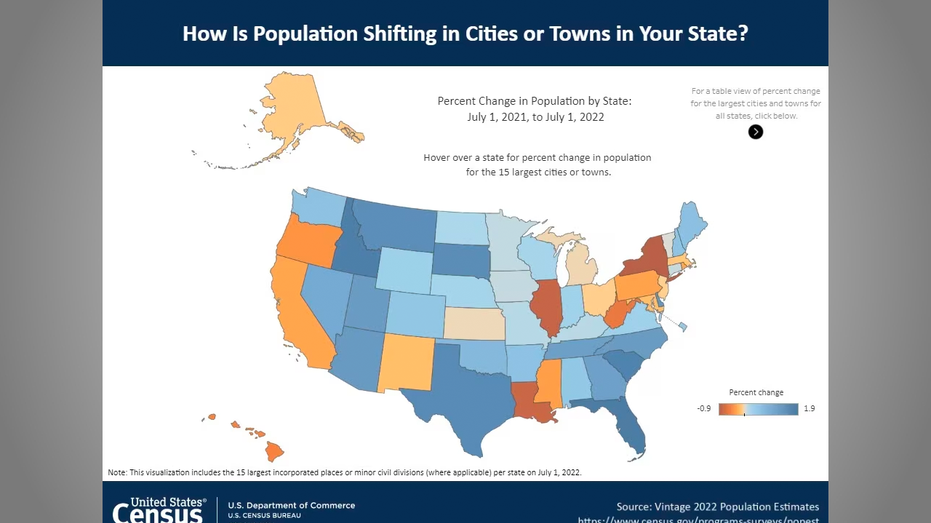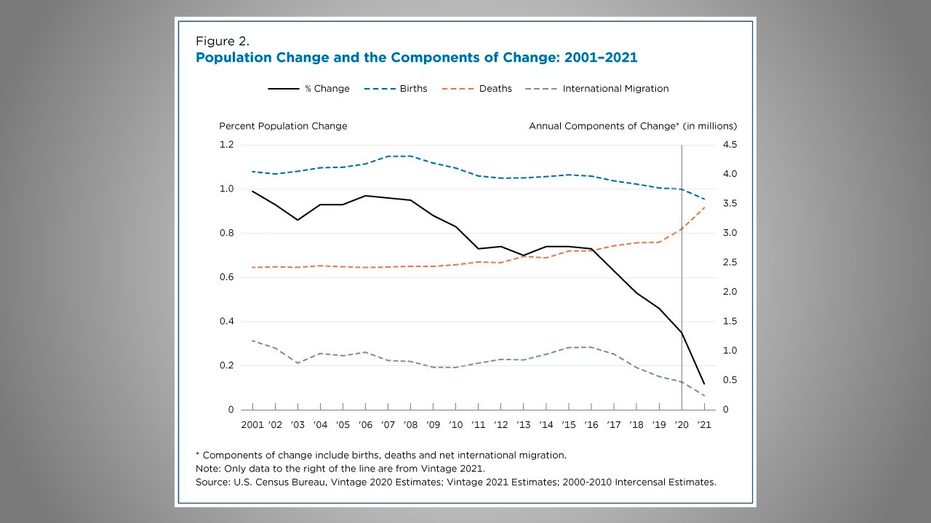
U.S. economy threatened by growing consumer debt.
America’s population is projected to shrink by 2100, and experts warn the decline could have significant economic consequences.
According to the U.S. Census Bureau’s “most likely” projection released on Thursday, the population of the U.S. will climb to a peak of 370 million in 2080 before shrinking at the turn of the century.
By 2029, Americans older than 65 are expected to outnumber kids under 18. Around 2038, the U.S. will likely see more deaths than births annually.
Apex Trader Funding CEO and Founder Darrell Martin told Fox News Digital that a population shrink would slow the speed of money, causing the economy to decelerate.
POPULATION RATE DECLINE IN THE US TRIGGERS ECONOMIC ALARMS FROM EXPERTS: ‘CALAMITOUS EFFECT’

Experts warn that a population decline in the U.S. could lead to a recession, more inflation, or worse. (iStock)
“It will slow down if there’s less people spending,” he said. “If it shrinks by the amount that they’re projecting, then that would result in a massive depression worse than we saw in the thirties.”
Martin speculated that various concerns among Americans have contributed to the declining birth rate.
Economic worries, anxiety about foreign conflicts, political division and lingering stress from the COVID-19 pandemic have put people off from having children, according to Martin. He noted that the common denominator across all these issues is a general feeling of uncertainty.
While all living American generations have scaled back on childbearing, Generation Z is most apprehensive about becoming a parent.
“For the newer generation, they’re not having [kids] at all,” Martin said. “I know quite a few myself that are like, we’re not having kids or we’re having like one kid. They want that freedom. They want that lifestyle their parents had, and they know there’s a lot of cost associated with having children.”
LA, CHICAGO, NEW YORK COUNTIES SAW GREATEST POPULATION LOSSES IN US IN 2022

This graph shows shifts in populations across the United States. (U.S. Census Bureau)
Gerard Filitti, senior counsel at The Lawfare Project, said population shrinkage has been endemic in society for many years and was interrupted only temporarily by the World War II boom.
In a way, Filitti said, population decline reflects our economy and the massive improvements made across sectors over the last 70 years. When people with more education enter the workforce and stay in it for longer, put off having children and have fewer children, you wind up with population decline.
He added that population decline would “absolutely” have negative economic impacts in the long term, with labor shortages leading to a decrease in GDP, inflation, and recession.
“It just basically sinks the economy for years to come unless there’s a massive increase in productivity,” Filitti said.
According to the census, the percentage of foreign-born people in the U.S. population will rise by 5.6% within 80 years.
CHINA’S POPULATION SHRINKS FOR FIRST TIME IN DECADES

The U.S. population only grew by a fraction of a percent in 2021. (U.S. Census Bureau )
Martin suggested that immigration and trepidation around higher education may help to mitigate the current trade deficit occurring in the U.S. With immigrants coming to America well-versed in construction, electrical, plumbing and more, as well as more young Americans going into trade schools, he predicted a surplus of skilled blue-collar workers.
However, when it comes to white-collar workers, especially in the information technology (IT) sphere, Martin said everything is “up in the air” as a result of artificial intelligence (AI). Typically, IT revolutions create a more significant number of new jobs versus the ones that it replaces. But Martin said the recent explosion of AI is on a “whole other level.”
“This is writing. This is programming. This is video production, it’s on and on and on down the list of jobs it’s taking away. I don’t know if there is a balance on how it’s going to bring jobs,” he added. “So, it may actually cause a huge deficit in the job market and that’s obviously another contributing factor to a lowering population.”
Filitti agreed that many pressures are associated with AI; however, he expressed some optimism. He suggested AI may be one of the mechanisms to boost productivity, thereby helping to level out the economy through labor participation.
NEW YORK TIMES OP-ED SAYS POPULATION DECLINE MAY MAKE ‘CLIMATE CHANGE EASIER TO COMBAT’
‘Fact-Checking the Fact-Checkers’ author Matt Palumbo calls out California Gov. Gavin Newsom’s claims about his state’s population loss and migration trends.
In the worst possible outcome, Filitti said virtually any office job could be at risk of being replaced with technology. While such a situation is not imminent, he said the concern is not something the world is ready for in the next 60 years.
“At the lower end, we have seen robots taking factory jobs. We have seen robots increase in use, even in construction. But a lot of these manual trade skills have remained resilient to advances in technology,” he said.
An increase in immigration and the use of AI could lead to several possible outcomes.
According to Filitti, one perspective is there will be more wealth disparity because wealthy Americans have fewer children.
However, he believes the more accurate way to look at it is there will be more availability of resources, more competitiveness, and more ability to transcend economic and social status. This is partly because, by virtue of becoming educated and skilled, people of lower income have more opportunities with fewer people on the higher end of the economic scale.
WHAT IS A PRO-NATALIST? ELON MUSK’S WARNINGS TO HUMANITY UNDERPIN A GROWING MOVEMENT AMONG TECH BILLIONAIRES

Experts say skilled trade workers and blue-collar employees could become more prevalent as time goes on. (Photographer: Al Drago/Bloomberg via Getty Images / Getty Images)
“I think in the short term there will be more disparity while these people are still actively participating in the labor market at the higher end. But as the years move forward and these people, to be blunt, die off, you will have more economic mobility by people who are currently in the lower income bracket, if you will, to advance and for their children to have more opportunities to grow,” Filitti added.
Martin added the future of Social Security is in jeopardy.
WHAT ARE THE DANGERS OF AI? FIND OUT WHY PEOPLE ARE AFRAID OF ARTIFICIAL INTELLIGENCE
Florida CFO Jimmy Patronis responds to the huge population increase in the Sunshine State on ‘Cavuto: Coast to Coast,’ remarking that ‘people will invest with their feet’
If the projections are accurate, Martin predicted it would further affect the stability of Social Security to the point where it may eventually no longer exist.
The concern around population decline is widespread. A steadily growing number of countries have adopted pro-natal policies. The United Nations (UN) found that since 1976, the number of countries with pro-natalist policies has gone from 10% to 15% in 2001 and then 28% in 2015.
Expansions in policies that push reproduction have been adopted in many nations, including Hungary, Poland, Greece, Korea, Japan, Latvia and Finland.
CLICK HERE TO READ MORE ON FOX BUSINESS
But Filitti said these policies often do not work effectively. Japan has tried to implement legal and economic measures that increase benefits to families with more kids and even cut benefits to older members of society to include them in labor for longer.
He said these policies have had minimal benefit and may not work in the U.S. either.
“We need more people to keep the economy going. Otherwise, you’re just using limited financial resources and just apportioning them effectively,” Filitti said.
For more Culture, Media, Education, Opinion and channel coverage, visit foxnews.com/media.








